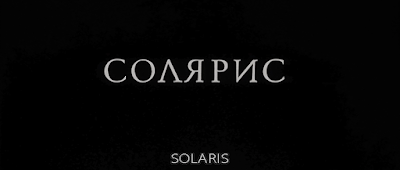A conversation with a friend this summer made me realize I'd never seen the previous 1972 film version of Solaris by Russian filmmaker Andre Tarkovsky, so we made a point of watching it this fall. It's a difficult film to like, especially in the beginning, as we watch characters watch films of lectures where people watch films, and where characters we never see again spend significant chunks of time navigating traffic to no evident purpose. Donatas Banionis as Kris Kelvin seems to have one facial expression: I know he's depressed because his lover committed suicide some years ago, but geeze! Find another setting than "mopey."
Maybe halfway through, though, it all clicked, and it became terribly gripping, with some fabulous dialogue, macabre humor, and great imagery-- especially the zero-gravity sequence, and Hari's final resurrection. Soderbergh's version definitely takes some cues from Tarkovsky's, including the increased focus on the human relationships. But Soderbergh's is, in some sense, all about those relationships, the planet Solaris just being a backdrop. Tarkovsky's version foregrounds the planet some more. This dialogue is striking:
We have no interest in conquering any cosmos. We want to extend the Earth to the borders of the cosmos. We don't know what to do with other worlds. We don't need other worlds. We need a mirror. We struggle for contact, but we'll never find it. We're in the foolish human predicament of striving for a goal that he fears, that he has no need for. Man needs man.Lem's book is in some ways about the foolishness of trying to find the human everywhere we look, of expecting everything we encounter to tell us something about the human condition. In some ways, this seems like a weird fit for the novel's own premise, given that it is about humans encountering a planet that is literally a mirror for their desires and experiences. Soderbergh's embraces that aspect. The end of his version has Kris Kelvin rejecting his mundane life on Earth to stay on Solaris so that he can recreate the life he once had with his dead lover, and hopefully make it work out properly this time.
Tarkovsky's, on the hand, maintains Lem's emphasis on the mysteries of the planet, even as it deepens the emotional story. At one point, Kris Kelvin is reprimanded:
Don't turn a scientific problem into a common love story.
A cynic might argue that this is exactly what Soderbergh did (I would say he turned it into an uncommon love story), but Tarkovsky keeps both. At one point, Kris seems to have totally given up on the problem of Solaris, losing himself in his personal problems, almost wallowing in the darkness of his own past.
What does it matter when you're worth more to me than any science could ever be?
But after Hari kills herself for the last time, Kris passes into a memory of his past, one where I think he rewrites what he did that day on Earth where Hari originally killed herself, meeting his mother and acquiring emotional closure. But unlike Soderbergh's Kris, who elects to return to his lover ("Rheya," in that version), Tarkovsky's Kris presses on.
Man was created by nature so he could learn her ways. In his endless search for the truth, man is condemned to knowledge.
His emotional demons satisfied, Kris can resume "his endless search for truth"; the love story ended, Kris can turn his attentions back to the scientific problem. Tarkovsky's Solaris is both a scientific problem and a love story, about both a man's emotional catharsis about his past and his confronting of the vast, forbidden frontier of the unknown. The end makes you think he's gone home at first; Soderbergh's pulls a similar trick. But while Soderbergh reveals that Kris actually stayed on the station to be with Rheya, Tarkovsky reveals that what seems to be Kris's father's house is actually a newly formed island on Solaris.
Though, even on Solaris, man finds a mirror.
Also, my new favorite burn:








No comments:
Post a Comment